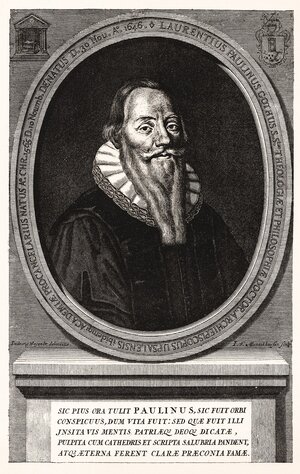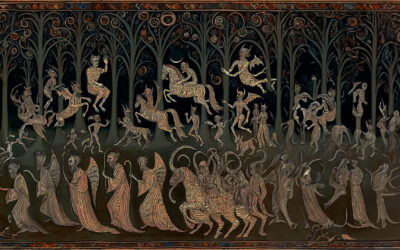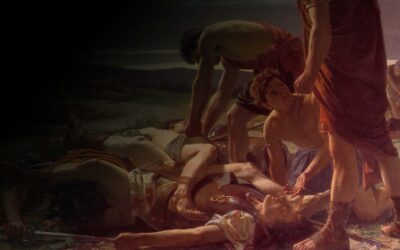Contents
Introduction to Latinitium’s yearly Halloween Special – Eques
Last Halloween we visited the rich well of German folktales telling a scary story from the brothers Grimm.
This year we will stay in Sweden and tell you a story, not a folktale, a fairy tale or a children’s story, but a real ghost story.
What do you mean by “real”, you might ask?
Well.
The story you’re about to hear took place in 1632 and had its beginning on the 6th of November, the day the Swedish king – the lion of the North – Gustavus Adolphus was killed in battle of Lützen.

The events of the story took place at the home of pastor Ericus Andeae Rogstadius in the parish of Sköldinge, Katrineholm in Sweden. This pastor and his parish were very much real at the time of the tale. He is not made up. Nor is the bishop of Strängnäs, Laurentius Paulinus Gothus, or his companion Mattias Ilsbodinus, who also plays a part in this story. They were all real and held the offices indicated in the story.

The story centers around a certain horseman, who rides up to the home of pastor Rogstadius and asks his permission to stay and rest for the night.
The story about the rider has been related, not as a made-up story, but as events that truly happened. We have used a version of it told in a book called Syner och Röster ur det fördolda by Karl August Nicander and Carl Gustaf Norling from 1838.
If the tale is really true, we will never know. But it is a good story.
Below you will find the video in Latin, an audio file as well as a transcription of the video.
Video in Latin
For more scary stories in Latin, you can always take a look at last year’s special about the Art of Shuddering from the brothers Grimm, or our second special about two ghost stories from Stockholm. You can also watch our very first Halloween Latin special that concerns ghosts and scary things in ancient Rome.
Audio in Latin
Listen to the audio of this episode here on Latinitium.com or in your podcast app:
Transcription of the video
Anno 1632. Gustavus Adolphus Rex Suetorum hoc die Lucenae occubuit.
Nox est eaque frigidissima hoc die mensis novembris. Ventus per arbores magnas atque tenebricosas spirat. Omnia nebula densa obducuntur. Ecce! Eques per nebulam equitat indutus tunica militari ex pelle alcina facta.
Per tenebras unum lumen conspicitur quod ex aedibus propinquis venit. Aedes quietae silva densa cinguntur. Sunt aedes Erici Rogstadii pastoris.
Eques ad aedes lente accedit.
Pastor equitem salutat eumque rogat unde veniat.
”Ex Germania,” inquit eques.
Tum, pastor rogat quomodo procedat bellum illud quod Sueti ibi iam diu gerant.
”Rex,” inquit eques, ”in pugna acerrima hodie cecidit.”
Pastor hoc vix credere potest. Secum cogitat: Quomodo hic eques scire potest regem mortuum esse, si rex hodie occisus est? Germania longe abest a Suetia. Nemo potest tantum iter uno die conficere.
Tum eques: ”Vera dico. Hisce oculis vidi regem nostrum mori.”
Eques rogat pastorem ut sibi liceat in aedibus eius ad tempus commorari et quiescere. Pastor non audet id negare, eumque ad cubiculum in summis aedibus situm ducit. Utinam ne fecisset!
Eques enim hospes solitus non est. Aedes inquietantur. Strepitus subinde audiuntur. Sonant vincula gemitusque. Pocula, mensae, sellae sua sponte moventur. Pecora e stabulis emittuntur. Caudae vaccarum colligantur. Singulis noctibus domus pastoris inquietatur, et in dies res peior fit.
Pastor Rogstadius epistulam ad Consistorium Strengnesia mittit qua auxilium implorat.
Laurentius Paulinus Gothus, episcobus, et Mattias Georgii Ilsbodinus, antistes templi catedralis, et notarius statim veniunt.
Ad cubiculum equitis ducuntur ubi suum quisque lectum accipiunt ubi dormiant. Comitibus urceus argenteus cerevesia plenus et candela ardens apponuntur. Episcopus et antistes statim obdormiunt. Notarius autem dormire non potest.
Horologium mediam noctem indicat.
Intrat eques.
Candelam de mensa sumit acceditque ad episcopum dormientem.
”Ecce! tu ades, Laurenti.” Tum pergit ad lectum antistetis. “Tu quoque ades, Matthia! Probe vos novi, homines praeclarae probitatis. Hahahae!”
Eques ad notarium accedit qui terrore perculsus sub stragulo se abscondit. Terrore commotus clamorem tollit quo episcopus et antistes e somno excitantur. Eques autem iam nusquam conspicitur.
Mox redit eques. Omnes vigilant. Eques ad mensam accedit urceumque cerevesia plenum sumit. Eques ad Laurentium accedit eique propinat.
”Bibe mecum, pater!”
Ad hoc episcopus: ”Numquam!”
Eques ad Mattiam accedit eique propinat.
”Bibe mecum, frater!”
Mattias urceum sumit quasi bibere vellet sed eum ponit. Tum stragulum tollit et altero femure sublato “Em tibi”, inquit, “propinationem!”
Eques iratus: ”Istud non impune feres!”
Episcopus et Antistes nomine Dei imperant equiti ut statim abeat et diluculo adsit. Eques nomine dei iussus abit.
Episcopus, antistes, notarius cubitum eunt.
At Mattias male dormit totam noctem horrendis imaginibus inquietatur. In somniis videt aliquem barbam suam abripere. Et, mane experrectus barbam tangit. Barba autem mento solvitur! Mentum iam est glabrum!
Sole orto eques ad cubiculum redit. Laurentius episcopus eum rogat quis sit et cur domum pastoris inquietet.
”Larva,” inquit, ”sum. Deus me iussit hic omnia perturbare dum homo hic olim interfectus sepelireturet auctor caedis poenas daret.”
”Quid narras?” inquiunt.
”Cadaver miseri,” inquit, ”in hypogaeo iacet.”
Eques non mentitus est. Corpus enim mortuum in hypogaeo mox reperitur. Corpus est filii pastoris quem ex priore uxore habuit. Hic peregre fugisse credebatur, sed falso. Nova uxor cum famulo privignum interfecerat eumque in hypogaeo defoderat.
Uxor capitis damnatur.
Privigni corpus effoditur et rite sepelitur.
Restat eques.
Sed nomine Dei equiti iam imperatur ne pastoris domum rursus inquietet. Mox episcopus et Antistes plumbeum fenestrae marginem perforant et equitem per foramen abire iubent.
Eques dubitat. ”Foramen minus est quam ut tunicam militarem ex pelle alcuina factam mecum feram.”
”Istud,” inquiunt, ”flocci non facimus. Per foramen exibis!”
Eques viris paret.
Postea foramen obturatum est ne rursus intrare posset.
Domus pastoris rursus quieta erat.
Sed iuxta ianuam de clavo pendebat tunica militaris ex pelle alcina facta, et etiam nunc ibi pendet.
















